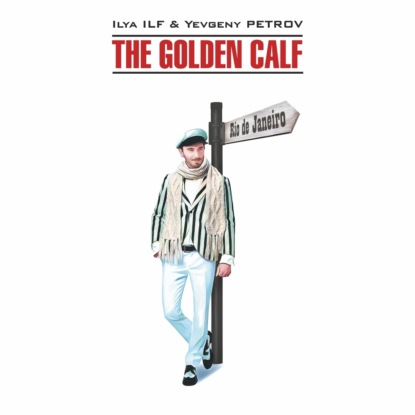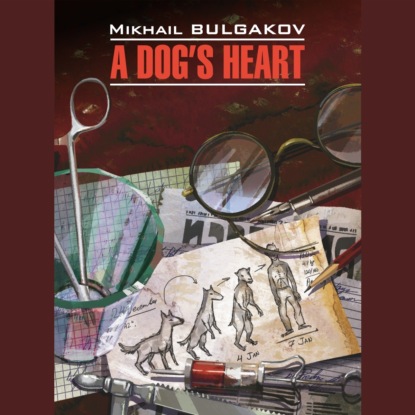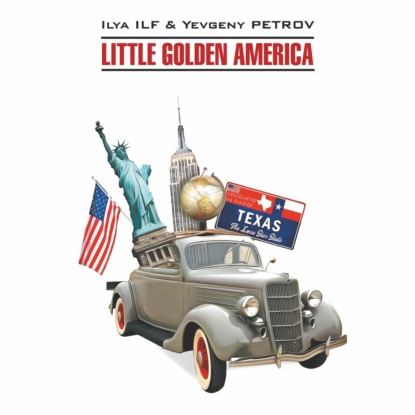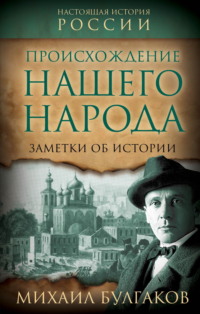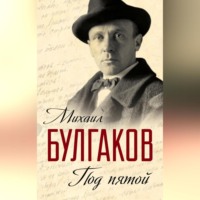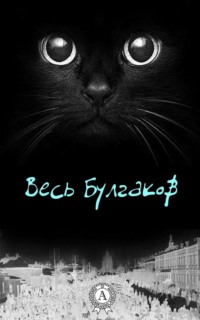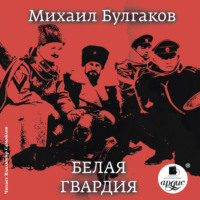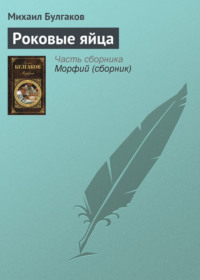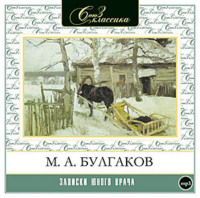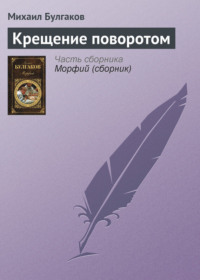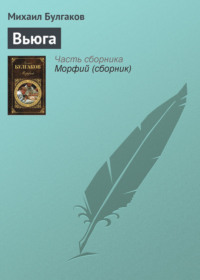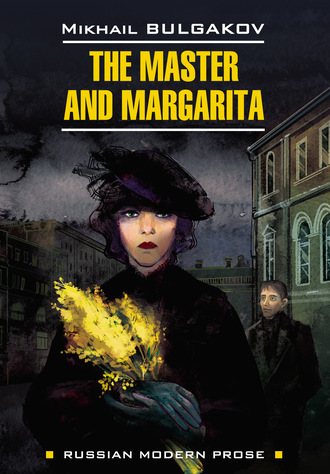
Полная версия
The Master and Margarita / Мастер и Маргарита. Книга для чтения на английском языке
The bewildered Ivan obeyed the joker of a precentor and shouted “Help!” but the precentor had duped him and did not shout anything.
Ivan’s lone, hoarse cry brought no good results. Two young women of some sort shied away from him, and he heard the word “Drunk!”
“Ah, so you’re in league with him?” shouted Ivan, flying into a rage. “What are you doing, making fun of me? Let me pass!”
Ivan threw himself to the right, and the precentor… went to the right as well! Ivan. to the left, and that swine went the same way too!
“Are you getting under my feet deliberately?” cried Ivan, going wild. “I’ll put you in the hands of the police too!”
Ivan made an attempt to grab the good-for-nothing[137] by the sleeve, but missed and caught hold of precisely nothing. The precentor had vanished into thin air.
Ivan gasped, looked into the distance and caught sight of the hateful stranger. He was already at the exit into Patriarch’s Lane – and, moreover, was not alone. The more than dubious precentor had managed to join him. But there was more: the third figure in the group turned out to be a tomcat that had appeared from out of the blue, huge as a hog, black as soot or as a rook, and with the dashing whiskers of a cavalryman. The trio moved out into Patriarch’s Lane with the cat setting off on its hind legs.
Ivan hurried after the villains and immediately realized it would be very hard to catch up with[138] them.
In an instant the trio had slipped down the lane and come out on Spiridonovka. However much Ivan increased his pace, the distance between him and his quarry did not decrease in the slightest. And the poet had not managed to collect himself before, after quiet Spiridonovka, he found himself at the Nikitsky Gates, where his situation worsened. Now there was already a crush. Ivan hurtled into[139] one of the passers-by and was sworn at. And what is more, here the gang of villains decided to employ that favourite trick of bandits – going off in different directions.
With great agility, while on the move, the precentor darted into a bus speeding towards Arbat Square and slipped away[140]. Having lost one of his quarry, Ivan concentrated his attention on the cat, and saw this strange cat go up to the footboard of an “A” tram that was standing at a stop, impertinently move a woman aside – she let out a yelp – catch hold of the handrail and even make an attempt to force a ten-copeck piece on the conductress through the window, which was open on account of the heat.
Ivan was so struck by the behaviour of the cat that he froze in immobility[141] by a grocer’s shop on a corner, and here he was struck for a second time, but much more forcefully, by the behaviour of the conductress. As soon as she caught sight of the cat clambering onto the tram, she shouted with an anger that even made her shake:
“No cats! Cats aren’t allowed! Shoo! Get off, or I’ll call the police!”
Neither the conductress nor the passengers were struck by the real essence of the matter: not the fact that a cat was clambering onto a tram, which would not have been so bad, but the fact that he was intending to pay!
The cat turned out to be not only a solvent, but also a disciplined beast. At the very first cry from the conductress he ceased his advance, took himself off the footboard and alighted at a stop, rubbing his whiskers with the ten-copeck piece. But no sooner had the conductress tugged at the cord and the tram moved off than the cat behaved like anyone who is expelled from a tram, but who does after all need to get somewhere. Letting all three cars go past him, the cat leapt up[142] onto the rear bumper of the last one, latched his paw onto some kind of hose that was protruding from the side and rode off[143], thus saving his ten-copeck piece.
In concerning himself with the vile cat, Ivan had almost lost the most important of the three – the Professor. But fortunately, the latter had not managed to slip away. Ivan caught sight of a grey beret in the dense mass at the top of Bolshaya Nikitskaya or Herzen Street. In the twinkling of an eye Ivan was there himself. However, he had no success. The poet increased his pace, and was even beginning to jog, bumping into passers-by, but not by a centimetre did he get closer to the Professor.
However upset Ivan might have been, still he was struck by the supernatural speed at which the pursuit was taking place. Not twenty seconds had passed after leaving the Nikitsky Gates before Ivan Nikolayevich was already blinded by the lights on Arbat Square. A few seconds more, and here was some dark lane with sloping pavements where Ivan Nikolayevich went crashing down and injured his knee. Again a well-lit main road – Kropotkin Street – then a side street, then Ostozhenka and another side street – cheerless, ugly and poorly lit. And it was here that Ivan Nikolayevich finally lost the man he so needed. The Professor had vanished.
Ivan Nikolayevich grew troubled, but not for long, because he suddenly realized the Professor was absolutely certain to be found in house number 13 and in apartment 47 for sure.
Bursting in through the doorway, Ivan Nikolayevich flew up to the first floor, found the apartment straight away and impatiently rang the bell. He did not have long to wait: some little girl of five or so opened the door to Ivan and, without asking the caller anything, immediately went away somewhere.
In the huge hallway – neglected in the extreme and weakly lit by a tiny little carbon lamp beneath a high ceiling, black with dirt – there was a bicycle without tyres hanging on the wall, a huge iron-bound coffer and, on the shelf above the coat rack, a winter hat with its long earflaps hanging down over the edge. Behind one of the doors a booming male voice in a radio set was shouting something angrily in verse.
Ivan Nikolayevich was not in the least disconcerted in the unfamiliar setting and headed straight into the corridor, reasoning thus: "He’s hiding in the bathroom, of course.” The corridor was dark. After banging against the walls for a bit, Ivan saw a weak little strip of light below a door, groped for the handle and tugged on it gently. The catch came away, and Ivan did indeed find himself in the bathroom, and he thought how lucky he had been.
However, he had not been quite as lucky as he might have wished! Ivan was hit by a wave of moist warmth, and, by the light of the coals smouldering in the geyser, he made out the large washtubs hanging on the wall and the bath, covered in ugly black spots because of the chipped enamel. And so, in this bath stood a naked citizeness, covered in soap and with a loofah in her hands. She squinted myopically at Ivan bursting in and, evidently mistaking him for another in the hellish light, said quietly and cheerily:
“Kiryushka! Stop messing around[144]! What are you doing – are you out of your mind?… Fyodor Ivanovich will be back at any moment. Get out of here this minute!” and she waved the loofah at Ivan.
There was an evident misunderstanding, and Ivan Nikolayevich was, of course, to blame for[145] it. But he did not mean to acknowledge it and, with the reproachful exclamation: “You wanton woman!” he for some reason found himself straight away in the kitchen. There was nobody in it, and mute on the cooker in the semi-darkness stood about a dozen extinguished Primus stoves. The one moonbeam that had filtered through the dusty window – a window unwiped for years – threw a meagre light on the corner where, cobwebbed and covered in dust, there hung a forgotten icon; poking out from behind its case were the ends of two wedding candles[146].[147] Beneath the large icon hung a small paper one, stuck up with a pin.
Nobody knows what idea took possession of Ivan at this point, but before running out to the back entrance, he appropriated one of those candles, and also the little paper icon. Together with these objects he abandoned the unknown apartment, muttering something and embarrassed at the thought of what he had just been through in the bathroom, involuntarily trying to guess who this brazen Kiryushka might be, and whether the offensive hat with the earflaps belonged to him.
In the deserted, cheerless lane the poet gazed around, looking for the fugitive, but he was nowhere about. Then Ivan said firmly to himself:
“But of course, he’s on the Moscow River! Onwards!”
It would quite likely have been the right thing to ask Ivan Nikolayevich why he supposed the Professor was specifically on the Moscow River and not in some other place elsewhere. But the trouble is that there was no one to ask him. The loathsome lane was completely empty.
In the very shortest time Ivan Nikolayevich could be seen on the granite steps of the amphitheatre of the Moscow River.
Having removed his clothes, Ivan entrusted them to some pleasant bearded man who was smoking a roll-up beside a torn white tolstovka[148] and unlaced worn-down ankle boots. After waving his arms around to cool down, Ivan did a swallow dive into the water. The water was so cold it took his breath away, and it even flashed through his mind that he would quite likely not succeed in coming to the surface. However, he did succeed in doing so, and, blowing and snorting, with eyes round from horror, Ivan Nikolayevich began to swim about in the black water, smelling of oil, between the broken zigzags of the street lights on the banks.
When the wet Ivan danced up the steps to the spot where his clothing had remained under the protection of the bearded man, it transpired that not only had the former been carried off, but the latter had too – the bearded man himself, that is. On the precise spot where there had been a heap of clothing, there remained a pair of striped long johns, a torn tolstovka, a candle, an icon and a box of matches. Shaking his fist in impotent fury at someone in the distance, Ivan robed himself in what had been left.
At this point he began to be troubled by two considerations: the first was that the MASSOLIT identity card with which he never parted had disappeared, and the second was: would he succeed in getting across Moscow unhindered looking like this? Wearing long johns, after all… True, it was nobody’s business, but all the same, he hoped there would be no kind of gripe or hold-up.
Ivan tore the buttons off the long johns where they fastened at the ankle, reckoning that, looking like that, they would perhaps pass for summer trousers, and, gathering up the icon, candle and matches, he moved off, saying to himself:
“To Griboyedov! Beyond all doubt, he’s there.”
The city was already living its evening life. Trucks flew by in clouds of dust with their chains clanking, and on their open platforms, sprawling on sacks with their bellies up, lay men of some sort. All the windows were open. In each of those windows burned a light beneath an orange lampshade, and, bursting out from all the windows, from all the doors, from all the gateways, from the roofs and attics, from the basements and courtyards, was the hoarse roar of the polonaise from the opera Eugene Onegin.[149]
Ivan Nikolayevich’s misgivings fully justified themselves: passers-by took notice of him and laughed and turned their heads. As a consequence of this, he took the decision to forsake the major streets and steal along little side streets, where people were not so importunate, where there was less chance they would pester a barefooted man, vexing him with questions about his long johns, which stubbornly declined to resemble trousers.
Ivan did just that, and plunged into the secretive network of the Arbat’s lanes, and began stealing along by the sides of walls, casting fearful sidelong glances, constantly looking around, hiding at times in doorways and avoiding crossroads with traffic lights and the magnificent doors of embassy mansions.
And during the whole of his difficult journey he was for some reason inexpressibly tormented by the ubiquitous orchestra, to the accompaniment of which a ponderous bass sang of his love for Tatyana.[150]
5. There Were Goings-on at Griboyedov
The old cream-coloured two-storey house was situated on the Boulevard Ring in the depths of a sorry-looking garden, separated from the pavement of the ring by fretted cast-iron railings. The small open area in front of the house was asphalted, and there, in the wintertime, a snowdrift with a spade in it towered up[151], while in the summertime it turned into the most magnificent section of a summer restaurant beneath a canvas awning.
The house was called The Griboyedov House on the grounds that at one time it had ostensibly been owned by the writer’s auntie, Alexandra Sergeyevna Griboyedova.[152] Well, did she or didn’t she own it? – we don’t know for sure. If memory serves, Griboyedov never even seems to have had any such house-owning auntie… However, that is what the house was called. And what is more, one mendacious Muscovite used to tell how, allegedly, there on the first floor, in the circular columned hall, the renowned writer used to read extracts from The Misfortune of Wit[153][154] to that same auntie as she lounged on a sofa. But then the devil knows – perhaps he did, it’s not important!
But what is important is that this house was owned at the present time by that same MASSOLIT, at the head of which stood the unfortunate Mikhail Alexandrovich Berlioz, until his appearance at Patriarch’s Ponds.
Following the example of the members of MASSOLIT, nobody called the house “The Griboyedov House”: everyone simply said “Griboyedov”: “I was hanging about for two hours at Griboyedov yesterday.” – “Well, and?” – “I got myself a month in Yalta.” – “Good for you!” Or: “Go and talk to Berlioz, he’s seeing people between four and five today at Griboyedov.” and so on.
MASSOLIT had settled into Griboyedov so well that nothing better or cosier could be imagined. Anyone going into Griboyedov involuntarily became acquainted first of all with the notices of various sports clubs, and with group and also individual photographs of members of MASSOLIT, hanging (the photographs) all over the walls of the staircase leading to the first floor.
On the doors of the very first room on that upper floor could be seen the large inscription: “Fishing and Dacha Section”, and there too was a picture of a crucian caught on the end of a rod.
On the doors of room No. 2 was written something not entirely comprehensible: “One-day writing trip. Apply to M. V. Podlozhnaya”.
The next door bore the brief but this time completely incomprehensible inscription “Perelygino”.[155] Then Griboyedov’s chance visitor would start to be dazzled by the inscriptions abounding on the auntie’s walnut doors: “Registration for Waiting List for Paper at Poklyovkina’s”, “Cashier’s Office. Sketch-writers’ Personal Accounts”…
Cutting through the longest queue, which had already started downstairs in the doorman’s room, one could see the inscription on the door people were trying to force their way into at every moment: “Housing Question[156]”.
Beyond the Housing Question there opened up a splendid poster on which was depicted a crag, and along its crest rode a horseman in a Caucasian cloak with a rifle over his shoulders. A little lower down were palm trees and a balcony, and on the balcony sat a young man with a little tuft of hair, gazing upwards with ever such lively eyes, and holding a fountain pen in his hand. The caption: “Fully inclusive writing holidays from two weeks (short story-novella) to one year (novel, trilogy). Yalta, Suuk-Su, Borovoye, Tsikhidziry, Makhindzhaury, Leningrad (Winter Palace)”. At this door there was also a queue, but not an excessive one: of about a hundred and fifty people.
Further on there followed, obeying the fanciful twists and ups and downs of the Griboyedov House, “MASSOLIT Board”, "Cashiers’ Offices Nos. 2, 3, 4 and 5”, "Editorial Board”, "MASSOLIT Chairman”, "Billiards Room”, various ancillary organizations and, finally, that very hall with the colonnade where the auntie had enjoyed her brilliant nephew’s comedy.
Any visitor who got into Griboyedov – if, of course, he wasn’t a complete dimwit – grasped at once how good a life those lucky members of MASSOLIT enjoyed, and sullen envy would immediately begin to torture him. And immediately he would address words of bitter reproach to the Heavens for their having failed to endow him at birth with literary talent, without which, naturally, there was no point even dreaming of securing a MASSOLIT membership card – brown, smelling of expensive leather and with a broad gold border – a card known to the whole of Moscow.
Who will say anything in defence of envy? It is a rotten category of feeling, but all the same, one must put oneself in the visitor’s shoes too. After all, what he saw on the upper floor was not everything – was still far from everything. The entire lower floor of auntie’s house was occupied by the restaurant, and what a restaurant! It was rightly considered the best in Moscow. And not only because it was accommodated in two large halls with vaulted ceilings, decorated with lilac horses with Assyrian manes, not only because on each table there stood a lamp covered with a shawl, not only because it could not be penetrated by the first person you came across in the street, but also because Griboyedov could beat any restaurant in Moscow at will with the quality of its provisions, and because those provisions were served at the most reasonable, by no means burdensome prices.
Thus there is nothing surprising in a conversation such as this, for example, which was once heard by the author of these most truthful lines beside the cast-iron railings of Griboyedov:
“Where are you dining today, Amvrosy?”
“What a question! Here of course, dear Foka! Archibald Archibaldovich whispered to me today that there’s going to be portions of pikeperch au naturel[157]. The work of a virtuoso!”
“You really know how to live, Amvrosy!” sighed Foka, emaciated, run-down and with a carbuncle on his neck, in reply to the rosy-lipped giant, the golden-haired, plump-cheeked poet Amvrosy.
“I don’t have any particular know-how,” Amvrosy objected, “just an ordinary desire to live like a human being. What you mean to say, Foka, is that you can come across pikeperch at the Coliseum too. But at the Coliseum a portion of pikeperch costs thirteen roubles fifteen copecks, whereas here it’s five fifty! Apart from that, at the Coliseum the pikeperch is three days old, and apart from that, you have no guarantee either that at The Coliseum you won’t get a bunch of grapes in the face from the first young man that comes bursting in from Teatralny Passage. No, I’m categorically against the Coliseum!” the gourmet Amvrosy thundered for the whole boulevard to hear. “Don’t try and persuade me, Foka!”
“I’m not trying to persuade you, Amvrosy,” squealed Foka. “We can have dinner at home.”
“Your humble servant,” trumpeted Amvrosy. “I can imagine your wife attempting to construct portions of pikeperch au naturel in a little saucepan in the communal kitchen at home. Tee-hee-hee!.. Au revoir[158], Foka!” And, humming away, Amvrosy headed towards the veranda beneath the awning.
Oh-ho-ho… Yes, it was so, it was so! Long-time residents of Moscow remember the renowned Griboyedov! Never mind boiled portions of pikeperch! That’s cheap stuff, dear Amvrosy! What about the sterlet, sterlet in a silver saucepan, pieces of sterlet interlaid with crayfish necks and fresh caviar? What about eggs en cocotte[159] with champignon purée in little bowls? And did you like the little fillets of thrush? With truffles? The quail Genoese style? Nine roubles fifty! And the jazz band, and the polite service! And in July, when the whole family is at the dacha and urgent literary matters are keeping you in town – on the veranda, in the shade of the climbing vine, a patch of gold on the cleanest of tablecloths, is a bowl of soup printanier[160]? Remember, Amvrosy? But why ask! I can see by your lips you remember. Never mind your white salmon, your pikeperch! What about the snipe, the great snipe, the common snipe, the woodcock according to season, the quail, the sandpipers? The Narzan that fizzed in your throat?! But that’s enough: you’re being distracted, Reader! Follow me!.
At half-past ten on the evening when Berlioz was killed at Patriarch’s, only one upstairs room in Griboyedov was lit, and in it languished the twelve writers who had gathered for their meeting and were waiting for Mikhail Alexandrovich.
Those sitting on the chairs, and on the tables, and even on the two window sills in MASSOLIT’s boardroom were suffering dreadfully from the stifling heat. Not a single breath of fresh air was penetrating through the open windows. Moscow was emitting the heat accumulated in the asphalt during the course of the day, and it was clear that the night would bring no relief. There was a smell of onions from the basement of auntie’s house where the restaurant’s kitchen was at work, and everyone wanted a drink – everyone was on edge[161] and getting angry.
The belletrist Beskudnikov – a quiet, respectably dressed man with attentive and at the same time elusive eyes – took out his watch. The hand was crawling towards eleven. Beskudnikov tapped the face with his finger and showed it to his neighbour, the poet Dvubratsky, who was sitting on a table, and out of boredom swinging his feet, shod in yellow rubber-soled shoes.
“Really,” grumbled Dvubratsky.
“The guy probably got stuck on the Klyazma,” responded the rich voice of Nastasya Lukinishna Nepremenova, a Moscow merchant’s orphan who had become a writer composing maritime battle stories under the pseudonym “Navigator George”.
“Forgive me!” the author of popular sketches Zagrivov began boldly. “I’d be happy to be drinking some tea on a balcony myself just now, instead of stewing in here. The meeting was arranged for ten, wasn’t it?”
“It’s nice on the Klyazma now,” Navigator George egged the company on, knowing that the literary dacha village of Perelygino on the River Klyazma was a shared sore point. “The nightingales are probably already singing. My work always goes better out of town somehow, especially in the spring.”
“I’m in my third year of paying in money to send my wife and her Basedow’s disease[162][163] to that paradise, but there doesn’t seem to be anything visible on the horizon,” said the novelist Ieronym Poprikhin with venom and bitterness.
“It’s just a matter of who gets lucky,” droned the critic Ababkov from the window sill.
Navigator George’s little eyes lit up with joy, and, softening her contralto, she said:
“You mustn’t be envious, Comrades. There are only twenty-two dachas, and there are only seven more being built, and there are three thousand of us in MASSOLIT”
“Three thousand one hundred and eleven,” someone put in from the corner.
“Well, you see,” continued the Navigator, “what’s to be done? It’s natural that the dachas were given to the most talented among us…”
“The generals!” the scriptwriter Glukharev butted into the squabble bluntly.
Beskudnikov left the room with an artificial yawn.
“Alone in five rooms in Perelygino,” said Glukharev in his wake.
“Lavrovich is alone in six,” cried Deniskin, “and the dining room’s panelled in oak.”
“Oh, that isn’t the point at the moment,” droned Ababkov, “the point is that it’s half-past eleven.”
A din started up – something akin to a revolt was brewing. They began ringing the hateful Perelygino, got through to the wrong dacha, to Lavrovich, learnt that Lavrovich had gone off to the river, and were thoroughly put out by that. Off the tops of their heads they rang the Commission for Belles-Lettres[164] plus the extension 930, and, of course, found nobody there.
“He could have telephoned!” cried Deniskin, Glukharev and Kvant.
Ah, they cried unjustly: Mikhail Alexandrovich could not have telephoned anywhere. Far, far from Griboyedov, in a huge hall lit by thousand-candle bulbs, on three zinc tables there lay what had until only recently been Mikhail Alexandrovich.
On the first was his naked body, covered in dried blood, with a broken arm and a crushed ribcage, on the second was his head, with the front teeth knocked out and with dulled, open eyes, unperturbed by the extremely harsh light, and on the third was a heap of stiffened rags.
Alongside the decapitated man stood a professor of forensic medicine, a pathological anatomist and his prosector, representatives of the investigation team, and Mikhail Alexandrovich Berlioz’s deputy at MASSOLIT, the writer Zheldybin, summoned by telephone away from his sick wife.


